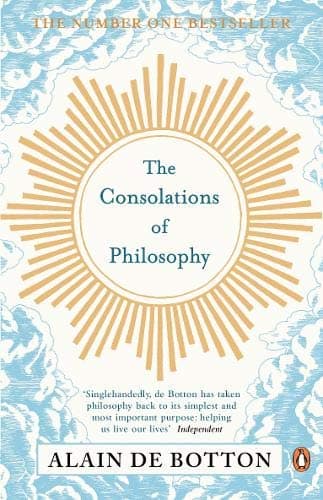
Alain De Botton, The Consolations of Philosophy
Value For Money
Alain De Botton, The Consolations of Philosophy
When you purchase through links on our site, we may earn an affiliate commission. Here's how it works.

User Reviews
Value For Money
It Might Be Unknown By You, But Everyone Has A Phi
It might be unknown by you, but everyone has a philosophy. A philosophy is what you believe. So if someone says "philosophy, what is that about then? You can tell them it is all about thinking like I did to a man in Hyde Park once. There is also a philosophy industry; a type of retail therapy where middle class white men tell the rest of us what to think. Some prefer a good Merlot or Shiraz, and then we can be our own therapist. The Consolations of Philosophy is a refreshing alternative to a normal being told what to think philosophy book, as it tries to engage the reader.
There is no problem with money, career, or even the love life, of any individual says Alain de Botton, that can not be put into perspective by philosophers whom have been wrestling with these issues as long as people could think. So if you want to get your life together then just think that the problems you're struggling with have been argued over by someone with an egg head for Millennia.
Heavy, deep and snooze related coma inducing thinking that may be, but in this book you will be surprised. The Consolations of Philosophy is written in ordinary language for a layman and not for a genius. It is a book that was the inspiration for a fantastic television series on philosophy. The author tries to be funny and frivolous, but not for the sake of it.
The book has six chapters where problems of unpopularity, lack of money, frustration, inadequacy, love, and other 'difficulties' are address by philosophers. Providing a semi-biographical insight into philosophers as people also works in this book, as they lived and breathed the viewpoints they expound. Schopenhaur, a miserable moral man who hated Hegel talked a lot on attraction and love as his melancholy disposition, and his dismal track record with the fairer sex allowed him to.
Socrates was Mr unpopular. He corrupted the youth of Athens by using rhetoric to make sound arguments look stupid, by finding out what someone thought and then rubbishing it by saying he knew nothing. This is still practiced today in universities.
Epicurus comments on not having money. He was a guru promoting the sensual he was on the side of orgies and excess. The Consolations of Philosophy calls Epicurus a fuddy-duddy, more of a Spartan cheapskate.
Seneca talks on frustration and on how to cope with mockery by inanimate objects. Being unable to program the video should have a calming effect rather than one of aggressive annoyance on us.
Montaigne revelled in his own simple ordinary inadequacies Alain de Botton comments. Montaigne's view was that "...it's possible to speak no Greek, fart, change one's mind after a meal, get bored with books, know none of the ancient philosophers" and still be more than adequate. Montaigne liked to shove radish up his bottom as well.
Nietzsche was the greatest philosopher of the 19th Century, and he talked about other difficulties. The author says Nietzsche's difficulties with life were because he thought he was God - a complex reaction to having a walrus for a moustache.
Some pictures of the philosophers are included in the book.
Nietzsche periodically went mad, as he would not accept his own nihilism he often burnt out his mind. He overcame this by Alpine walks through Switzerland. I have been there, so I know it is awe inspiring. On one notable occasion he cracked, decided to turn his back on philosophising and settled on gardening. He resigned his post, as no one went to his lectures anyway at Basel University, and set forth on a simpler, natural nihilism. Life of a worker did not appeal however, so in a matter of weeks he was back at his desk writing again. Nietzsche had returned to his essence and his truth. He was a wise man, and one that the world had never seen before. He recognized the 'Death of God', which means we can no longer be hoodwinked into being told what we think, unless we want to be by those with power; be they the Church, the University or the State, or even Big Business. This should be enough to console you or any one else. The internet and the age of the computer allow for you to do quality research on your own philosophy and your own beliefs, so you to can be a guru in your own time like Nietzsche.
Value For Money
Alain De Botton, The Consolations Of Philosophy: A
Alain De Botton, The Consolations of Philosophy: Alain De Botton enlists the collective wisdom of six philosophers, from the ancients to the 19th Century, and reflects on maladies such as frustration, a broken heart and not having enough money. What a timely work!
Socrates advises us on thriving despite unpopularity; Epicurus reassures us that it is all right to not have enough money; Seneca enlightens us on the cure for frustration; Montaigne consoles us for feeling inadequate; Schopenhauer heals our broken hearts; and Nietzsche helps us overcome our difficulties.
De Botton is an entertaining and enlightening writer. He has a gentle and insightful wit and a strong sense of irony. Katherine Wylie.
Q&A
There are no questions yet.